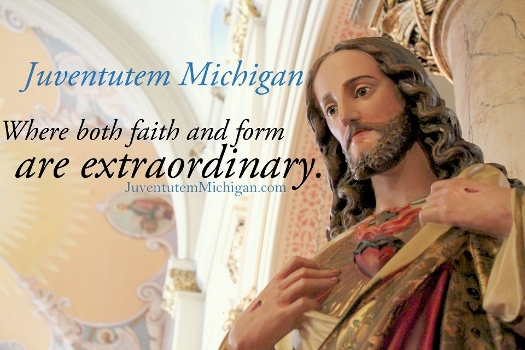
"I will go in unto the Altar of God
To God, Who giveth joy to my youth"
Tridentine Community News (May 26, 2013):

Composer Profile: William Byrd
This week we begin an occasional series profiling the major composers of sacred music often heard at Extraordinary Form Masses. William Byrd was an Englishman who lived from 1539-1623. Like many of history’s greatest composers, Byrd began composing his oeuvre in his teenage years. At the age of 24 he was appointed organist and choir director at [the Anglican] Lincoln Cathedral.
Anglicans have long had a tradition of singing the Hours from the Anglican Breviary. Befitting his position in Lincoln, Byrd wrote settings of the Anglican Matins and Evensong services.
An accomplished keyboard player as well as a composer, Byrd in 1572 was appointed to the Chapel Royal, where he was able to play for Queen Elizabeth and make connections that expanded his reputation.
He and another prolific composer of the era, Thomas Tallis, jointly applied for and in 1575 were granted a patent on the printing of music. Their first work, Cantiónes quæ ab arguménto sacræ vocántur, published in 1575, consisted of 17 Latin motets each by Byrd and Tallis, dedicated to the 34 years of Queen Elizabeth’s reign. In 1589 and 1591, Byrd published two volumes of Cantiónes sacræ, a collection of motets, which are choral pieces of a sacred character.
Though we may think of Byrd as primarily a composer of sacred music, in reality he turned out many secular pieces as well, notably a 1588 collection of songs meant to be accompanied by a consort of instruments, and a 1589 set of songs in the style of madrigals, which are musical settings of poems. Interestingly, even these purportedly secular works incorporated sacred elements. The latter collection included settings of seven psalms, for example. It is a sobering comment on our present times that even “popular” music of Byrd’s era strove to elevate the mind to God.
Byrd also composed instrumental pieces, some for keyboard, and some for instrumental consorts. People he met through his post at the Chapel Royal drove the creation of many of these pieces.
Though an Anglican by upbringing, in the 1570s Byrd began to associate with Catholics. Among the approximately 50 motets he wrote, a recurring theme in the texts chosen was persecution of God’s chosen people, which scholars interpret to be a sign of Byrd’s sympathies towards those who continued to practice Roman Catholicism in post-Reformation England. He and his wife were themselves accused of being recusants, though they appeared not to have suffered much if at all for their attachment to the True Faith.
Byrd began to compose Mass settings in 1592. In 1605 he published the first volume of his Graduália, an effort to set the Propers of the Mass to polyphony. As we wrote in a recent column, while Propers are sung to Gregorian Chant most of the time, it is permissible to have polyphonic settings of them. Byrd wrote settings for the Propers of most of the major feasts of the Church year. This made it possible for a given Mass to be all-Byrd, both the Propers and the Ordinary [Mass setting]. Much has been written about the melodic and harmonic significance of Byrd’s compositions. Such discussions are beyond the scope of this column, but for those interested, plentiful analyses are available in scholarly publications and on-line. Byrd was extraordinarily prolific, with a body of approximately 470 compositions. As a testimony to how much can be drawn from his work, each summer, one of the world’s most renowned Latin Mass choirs, Portland, Oregon’s Cantóres in Ecclésia, organizes a William Byrd Festival, a multi-week event of concerts, liturgical services, and lectures. To see what was on offer in 2012, see their web site, www.byrdfestival.org.
Nowadays Byrd is held in esteem by both Catholics and Anglicans. This is an important lesson; there is no need to label disparagingly certain music as Protestant if the texts express concepts not antithetical to Catholic teaching. An analogy might be found in stained glass: If a beautiful stained glass depiction of a saint is found in an Anglican church, it is not “bad art” simply because it may have been commissioned for a Protestant edifice. Art meant to glorify God in an orthodox fashion is good art, period. This is one area in which Protestants and Catholics can agree to their mutual benefit and spiritual edification.
Some of the works of William Byrd are in the regular repertoire of Assumption’s Tridentine Mass Choir, most significantly his Ave Verum Corpus (Hail True Body), often referred to simply as Ave Verum. Byrd’s Mass for Three Voices (arrangements available for Soprano-Tenor-Bass, Alto-Tenor-Bass, or Soprano-Alto-Bass), Mass for Four Voices (Soprano-Alto-Tenor-Bass), and Mass for Five Voices (Soprano-Alto-Tenor-Tenor-Bass) are also performed several times per year.
Tridentine Masses This Coming Week
- Mon. 05/27 7:00 PM: Low Mass at St. Josaphat (St. Bede the Venerable, Confessor & Doctor)
- Tue. 05/28 7:00 PM: Low Mass at Assumption-Windsor (St. Augustine of Canterbury, Bishop & Confessor)
- Fri. 05/31 7:00 PM: High Mass at Basilica of St. Adalbert, Grand Rapids, Michigan (Queenship of Mary)



I mean no disrespect to the author of this column -- but he is utterly mistaken on one point. Protestant musical demands (when they weren't to avoid the use of music altogether) were very different from the requirements of Catholic music. Compare Tallis' "If ye love me" to this same composer's "Stabat Mater".
ReplyDeleteMust one say that Protestant music is bad and Catholic music is good? Anything which proceeds from Protestant theology is, by definition, damaged at the very least. "Ave Verum Corpus" of Byrd, though it has a small number of melismae is written on a theological topic which only Catholics can address correctly. To sing "Ave Verum Corpus" to a piece of bread would be blasphemy, but it would also be repugnant to the Protestant mind.